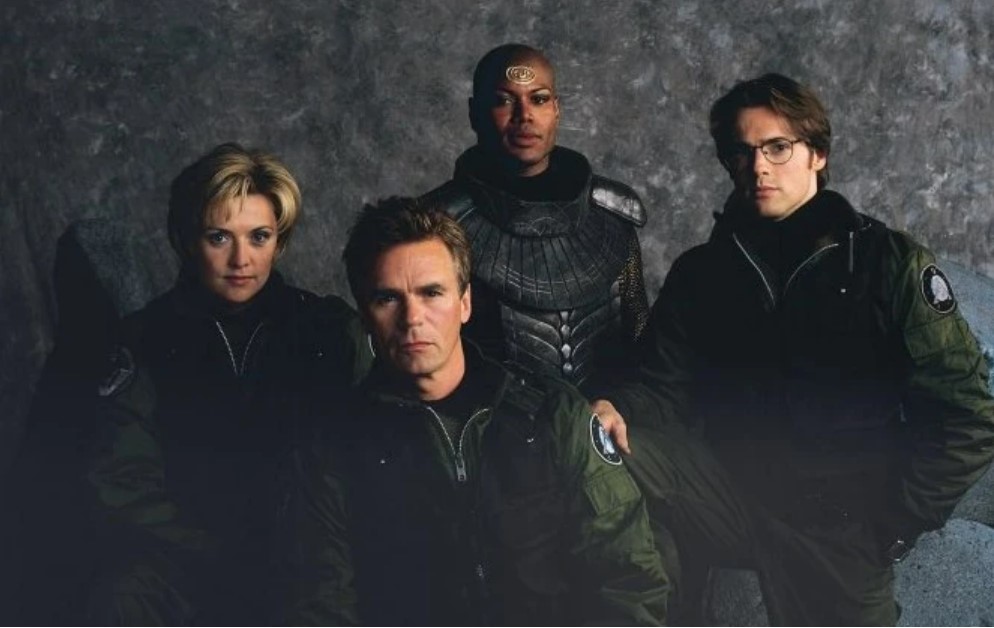
Stargate: A Million Light Years From Home and Still Killing Girlfriends (and Boyfriends!)
March 13, 2023
Welcome, my friends, to your introduction post for our latest contestant franchise, Stargate. Oh, and what a franchise it is, having the third-longest runtime of any sci-fi series ever (behind Doctor Who and Star Trek, which are both much older).
The premise of Stargate can be summarized as, "The US Air Force discovers an ancient device that allows instantaneous travel between planets. Adventures ensue."
Those adventures include discovering that most historical religions were based on encounters with 3 separate races of god-impersonating aliens, who have secretly influenced pretty much all of human development. Another revelation is that humans didn't evolve on Earth, but were rather "seeded" there (and on a whole bunch of other planets across 3 galaxies) by a precursor race known as the Ancients (who have since ascended to a non-corporeal plane of existence). Consequently, it's perfectly OK to date people from other planets/galaxies/timelines/realities, because they're not exactly "aliens."
Naturally, though, most of one's otherworldly partners do have to die, for narrative reasons.
The franchise includes the feature film Stargate (1994), as well as 3 TV series:
- Stargate SG-1 (1997-2007, with 2 direct-to-DVD sequels released in 2008);

- Stargate Atlantis (2004-2009);
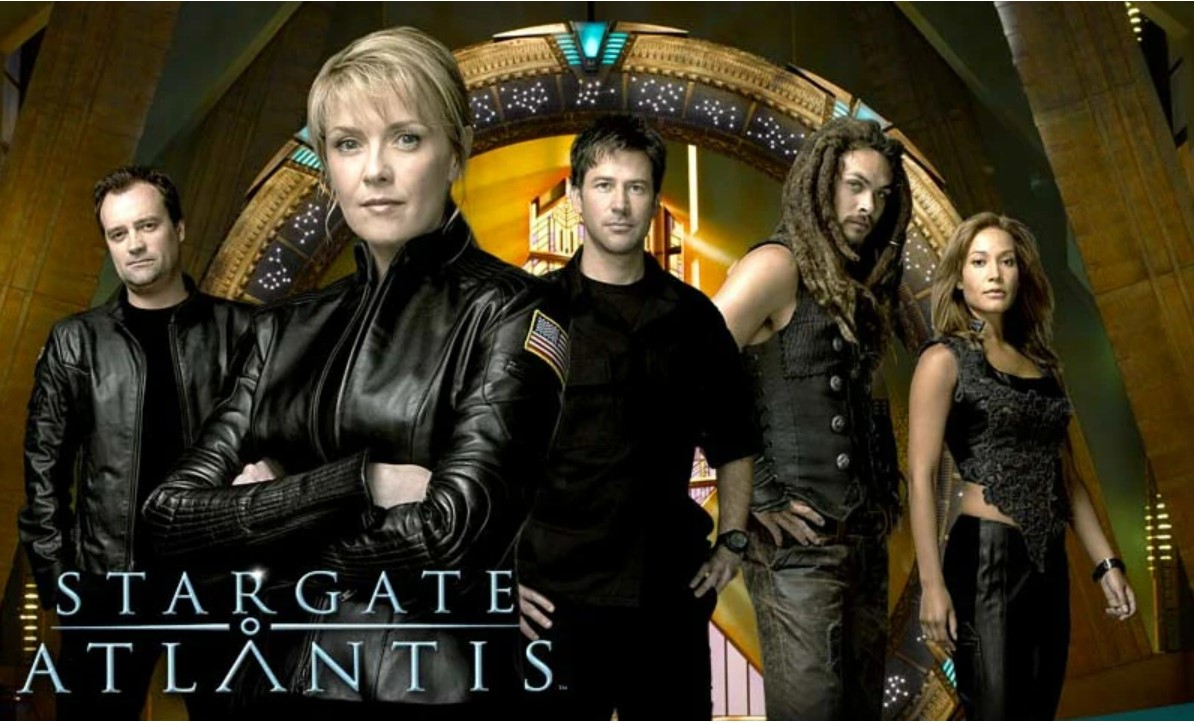
- Stargate Universe (2009-2011)
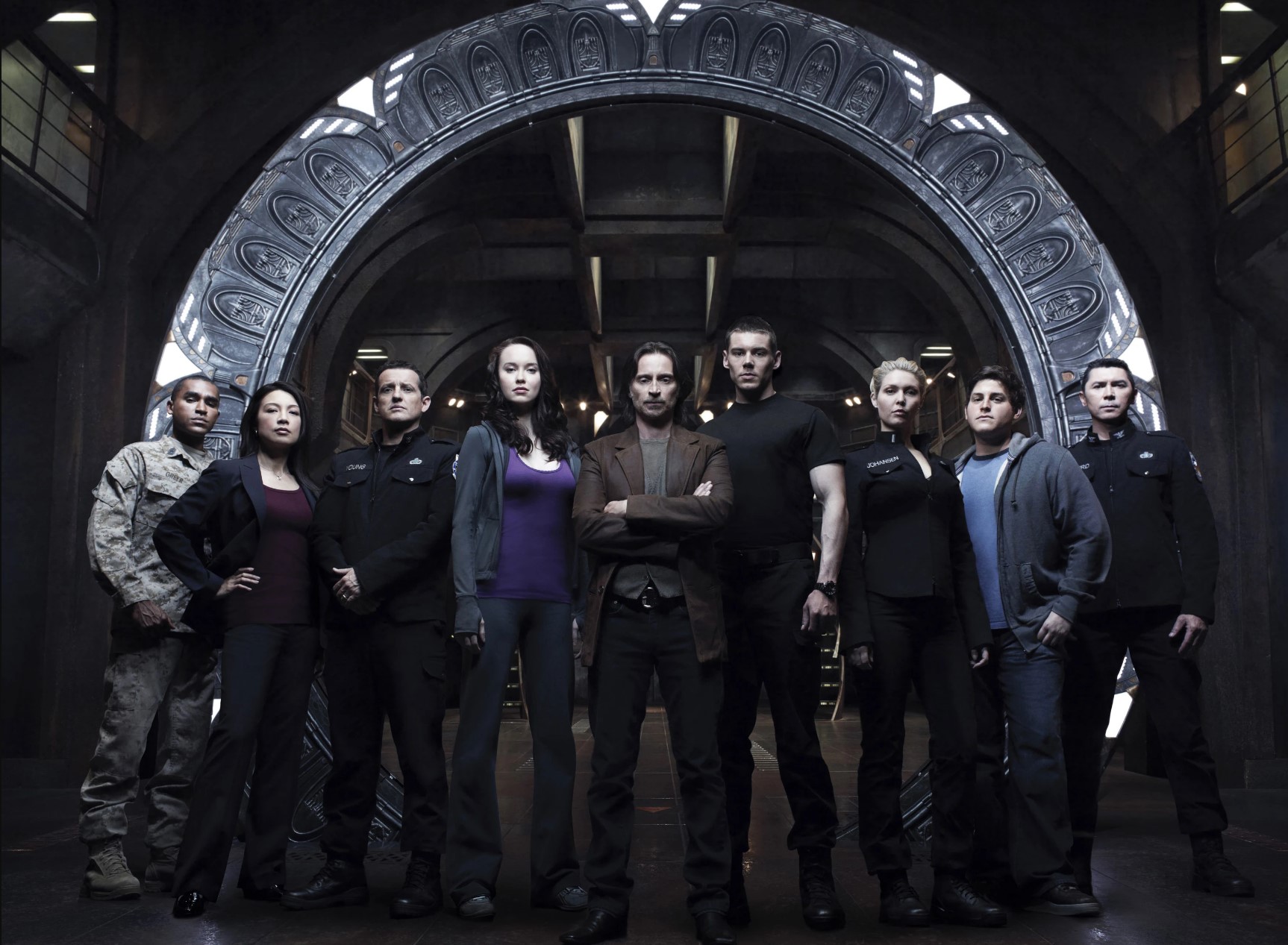
Plus a variety of supplemental media like audio plays, books, comics, web series, and so forth.
Fun fact: the first eight seasons of SG-1 star MacGyver alum Richard Dean Anderson as Col. Jack O'Neill, making him our most-watched DFGRR actor. He breaks the record previously held by William Shatner.
The Times
Many things happened between 1994, when the first Stargate movie came out in theaters, and 2011, when Stargate Universe was canceled. For one example, the cast of Universe found out they were getting canceled from Twitter, which hadn't existed until SG-1's 10th season. For another, those 17 years represent the whole time that Don't Ask Don't Tell was in effect for the US military, much to the chagrin of every slash-fiction writer in the fandom. (For an inkling of how dedicated to same-sex pairings fanfic authors are, though, I'd like to point out that DADT got its own tag on Archive of Our Own.)
Back when Stargate was made, it seemed like the world was entering a period of peace and international cooperation. This turned out not to be exactly true. See, 1994 was the year that South Africa held its first multiracial elections; that the US entered NAFTA; and that the Kingdom of Jordan made peace with Israel. 2011, by contrast, was the year of Occupy Wall Street, the Arab Spring, and the killing of Osama bin Laden.
Speaking of Al Qaeda, Stargate's run also encompassed the first 10 years of the War on Terror. Oddly, 9/11 is never directly referenced, despite the fact that SG-1's primary setting is an Air Force base hidden underneath NORAD's Cheyenne Mountain headquarters.
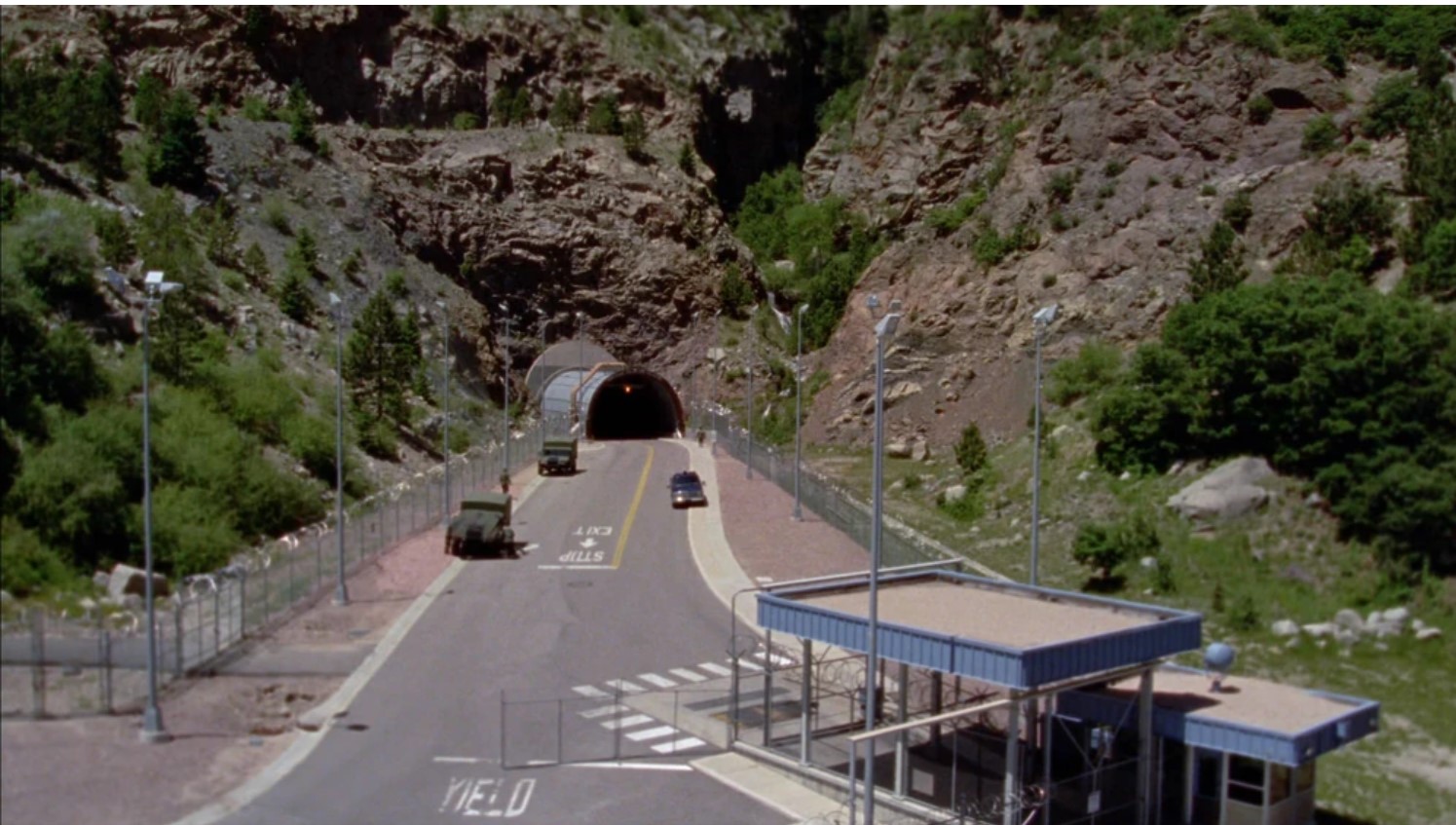
You'd think both the USAF and NORAD would be fairly preoccupied with terror attacks coming from the air, wouldn't you? But no, season 5 of SG-1 simply takes a hiatus between September 8, 2001 and March of 2002, and the characters never again speak of those months. This silence continues to hold even when Atlantis introduces an Afghan War veteran as a main character (who specifically describes fighting "the Taliban," so we can rule out the possibility that he invaded Afghanistan for some other reason). Presumably, this means 9/11 did happen offscreen somewhere, but the writers weren't willing/able/emotionally prepared to incorporate it into a storyline.
There is also a throwaway joke about the real-life incident where Vice President Dick Cheney shot someone on a quail hunt.
Gen. Landry: The last thing we need is for this place to turn into the O.K. Corral.
Col. Mitchell: Or a vice presidential bird hunt.
- "Uninvited" (aired 2006-08-11)
This indicates that in-universe, Cheney became VP to the fictional President Hayes at some point after his first VP, Robert Kinsey, was forced to resign because of his cowardly actions during an alien attack. It is not known how well Cheney handled alien attacks.
The Characters Under Consideration
All Stargate shows have ensemble casts and a hostile attitude towards stable long-term relationships, so I could write a long list of folks whose love interests tend to bite the dust. For simplicity's sake, though, I'm going to focus on the two who most obviously suffer from the Cartwright Curse. For that, we want one man and one woman. Representing the male side, we have...
♂ Dr. Daniel Jackson (Stargate and Stargate SG-1)
Dr. Daniel Jackson (Michael Shanks) is an archaeologist/linguist who also practices midwifery as a hobby, and serves as a member of an Air Force combat unit despite not being in the US Air Force. He speaks a lot of languages, which serves as the in-universe justification for why no one ever has trouble understanding aliens.
The role of Daniel Jackson was originated by James Spader in the 1994 theatrically released movie, where he starred alongside Kurt Russell as Col. Jack O'Neill.
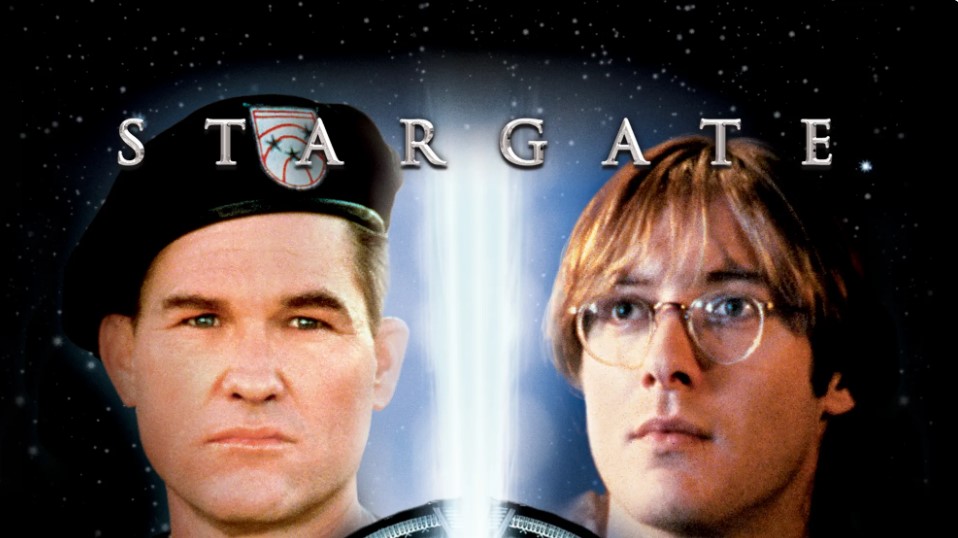
When the movie got turned into a cable TV show, however, both roles were recast and production moved to Vancouver. Therefore, the most iconic version of Dr. Jackson is the one played by the Canadian national treasure, Michael Shanks.
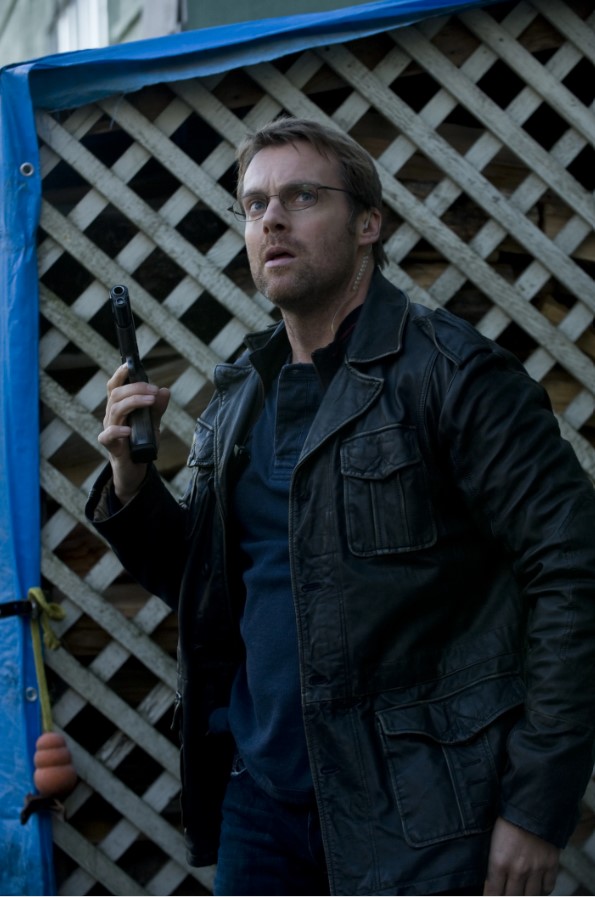
Does he have a Requisite Tragic Backstory?
Oh, you know he does. For starters, he's an orphan whose only surviving grandparent was too mentally unstable to adopt him, so he grew up in foster care. Once he entered academia, his seemingly insane theories about the pyramids being built by aliens got him shunned by his colleagues and dumped by his girlfriends. Eventually, an eccentric German archaeologist recruited him to translate some obscure hieroglyphs using the following sales pitch:
Dr. Jackson: I'm gonna go now.
Catherine Langford: Go where? I mean, you've just been evicted out of your apartment, your grants have run out: everything you own are in those two bags. You wanna prove that your theories are right? This is your chance.
Shortly thereafter, he finds a way to turn the Stargate on, and adventures ensue.
What kinds of adventures?
In the movie alone, he gets mistaken for an emissary of the Egyptian sun god Ra; is married off to a local priest's daughter, with whom he shares no common language; decodes the local language and achieves fluency in a matter of hours; is fatally shot with a laser gun (only to be revived via magical sarcophagus that Ra, or at least the alien calling himself Ra, happens to have); inspires a slave rebellion by accident; cures Colonel O'Neil's suicidal depression with a pep talk; and becomes the first human since World War II to deploy a nuke in a combat situation, when he uses it to kill the aforementioned alien/Ra. The movie ends with him staying on the planet Abydos in order to give his unexpected marriage a chance.
A year later in the SG-1 pilot, his wife gets kidnapped by another alien (this one impersonating the Egyptian moon god Apophis), and additional adventures ensue.
His luck ain't all bad, though: across the entire Stargate canon, he is estimated to have died between 6 and 22 times, and he always gets resurrected.
O'Neill: How many times have you thought he was gone, and then he shows up -- in one form or another? I'm sorry, but we're not having a memorial service for someone who is not dead. (to the empty room) You hear that?! I'm not buyin' it! (to Sam) What? He's just waitin' for us to say a bunch of nice things about him. Next thing you know, he'll come waltzin' through that door, like, right now.
- "Threads" (aired 2005-02-08)
Now, representing the female side of the curse, we have...
♀ Sam Carter (Stargate SG-1, Stargate Atlantis, and Stargate Universe)
...who, unlike Dr. Jackson, did not appear in the original Stargate movie. She's played across all 3 TV shows by the one and only Amanda Tapping.
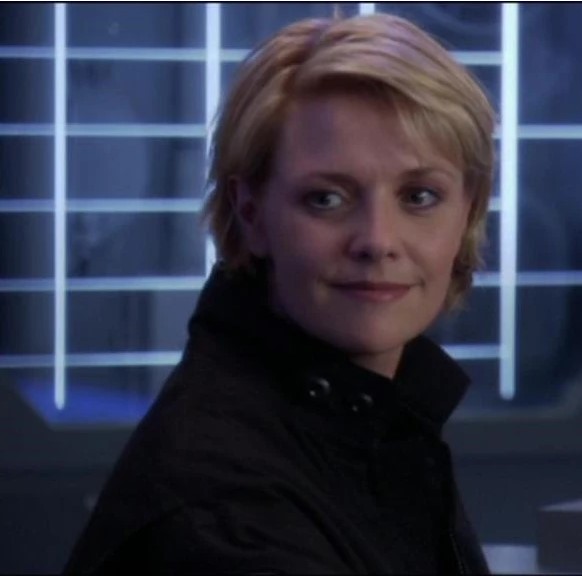
Dr. Samantha "Sam" Carter is a brilliant Air Force astrophysicist who serves, over the course of an eventful career, as a member of the frontline SG-1 team that leads missions through the Stargate; as the head of the Earth mission to Atlantis (a city in the Pegasus galaxy); and as the commander of a faster-than-light starship named the George Hammond.
She also has 8 years of will-they-or-won't-they tension with Jack O'Neill, her commanding officer, who is canonically stated to be in love with her. They could never get together on-screen because the US military - which backed the show - has laws against romantic involvement with one's CO. But, the audience absolutely loved the ongoing flirtation between them. This means that the writers kept Carter perpetually single in order to give the fans juuuust enough hope that she and O'Neill would find a way.
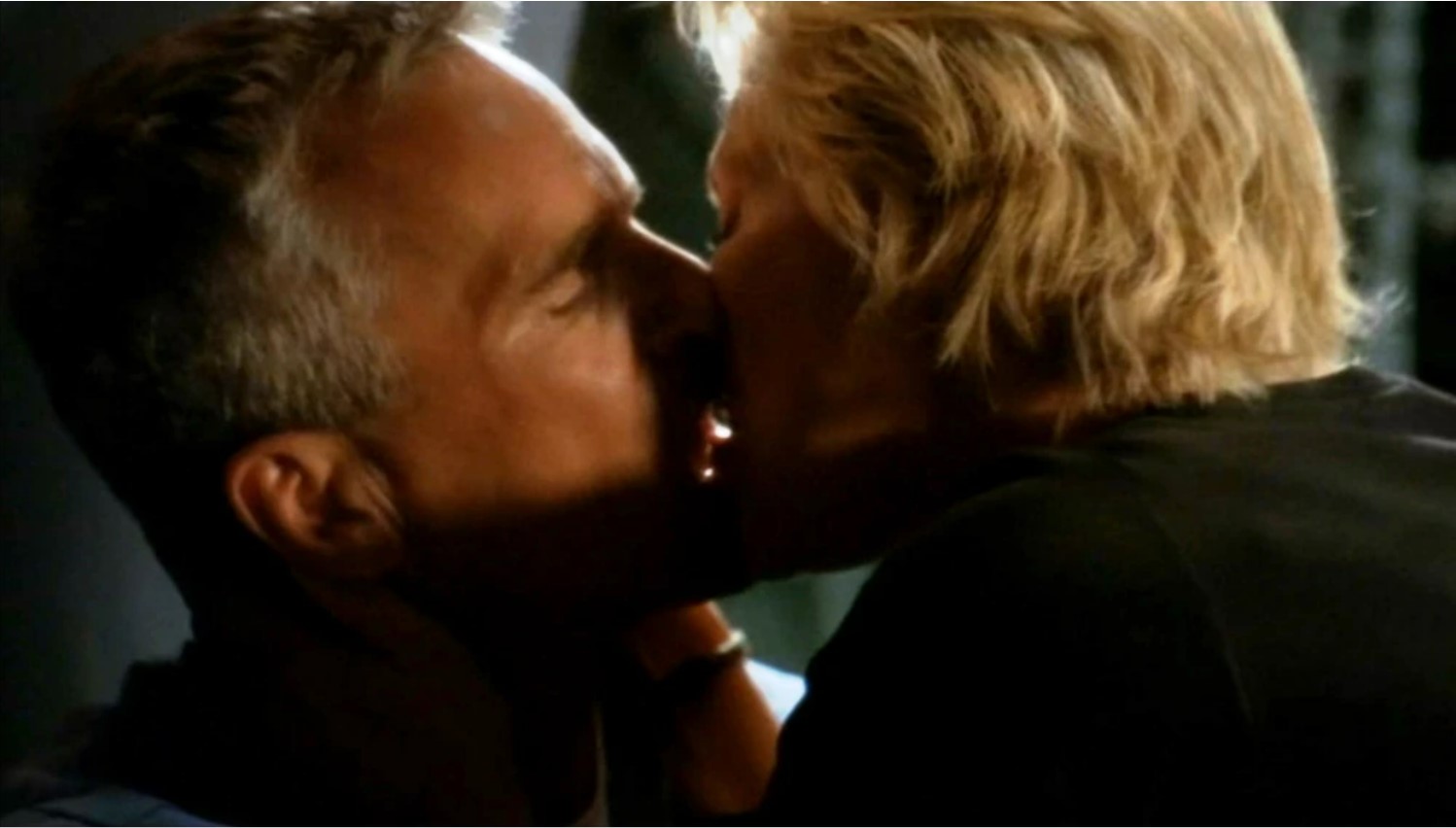
The result, as you may imagine, was a heaping helping of dead love interests. And also overreliance on the idea that a self-respecting, intelligent, independent, beautiful, accomplished woman would actively avoid dating, for nearly a decade, because she's pining over her much-older boss. It's a strain on one's suspension of disbelief, even for sci-fi, is what I'm saying.
Does she have a Requisite Tragic Backstory?
Yes, though not quite as tragic as Daniel's. Her mother died in a car accident when she was a teenager, and she and her brother partially blamed her father. Consequently, she, her brother Mark, and her father Jacob were somewhat estranged when the show began. Fortunately, in season 2 her father's terminal cancer was cured by an alien parasite known as a Tok'ra, which moved into his brain and shared his body/consciousness for the rest of its life. This Tok'ra, named Selmak, convinced the Carters to mend fences, and after that everything was fine. (Until her father and Selmak both died at the end of season 8, that is.)
That's what passes for a happy ending on this show, so please adjust your expectations accordingly.
Are there women on screen?
Yes! I am going to deduct 1 point from this franchise's Feminism Score, which is a thing I just made up, for the fact that it wrote all 3 of the movie's significant female characters out of the TV show(s). But it easily earns that point back by having women as regular cast members. This is, in fact, a first for the DFGRR. So...woohoo! Girl power!
Specifically, the aforementioned Amanda Tapping appeared as Sam Carter in a combined total of 238 episodes of SG-1, Atlantis, and Universe, plus the two made-for-DVD movies. And when she had to take maternity leave during SG-1 season 9, the producers brought in Claudia Black of Farscape fame to play Vala Mal Doran, who became a series regular in season 10. Then, Atlantis had both Rachell Luttrell as Teyla, an alien who joins the earth-based expedition team, and Torri Higginson as that expedition's first leader, Dr. Elizabeth Weir. Finally, Universe had no fewer than three women in the main cast, including the incomparable Ming-Na Wen. This franchise practically has enough ladies to qualify as a sorority, is what I'm saying.
Better yet, for the most part, these women are not treated markedly differently from the men. Very few of their episodes are about things like gender-based violence, or sexual harassment, or love triangles, or work/life balance for mothers, or damsel-in-distressing, or any of the other cliche plots that screenwriters like to write women characters into. Those types of plots do come up, but they are a minority compared to episodes about, say, Carter blowing up a sun. For the most part, the women of Stargate are treated with respect and professionalism by most of the people they meet, and they're shown kicking ass right alongside their male coworkers.
It is, in fact, a refreshing change of pace from everything else I've watched for the DFGRR.
Are there any women behind the scenes?
Depressingly few, by comparison. As far as I can tell, only 1 episode from each of the TV series was directed by a woman - and in SG-1's case, that woman was Amanda Tapping, so she was pulling double duty. Across the entire franchise, 28 episodes were written by women, out of 352 episodes total (so about 8%, for those of you keeping score at home). To be fair, Katharyn Powers was a story consultant for one season of SG-1, and Heather Ash was a story editor for another. In 2010, for the second and final season of Universe, Linda McGibney took on the role of Supervising Producer.
Otherwise, though, you have to run pretty far down the crew credits before you find a female name, often somewhere around casting director.
Hot take, folks: I'm beginning to think sci-fi might be a bit of an old boys' club.
Why is this franchise of interest to the DFGRR?
This is the first series I started watching specifically for the DFGRR, and it's because my friend Lexi told me lots of love interests kick the bucket in this universe. In my "So What About Dead Boyfriends?" post, I pointed out that Sam Carter is listed as a victim of the Cartwright Curse on TVTropes, but so are two* of her male teammates. (*Daniel is one; the other, Teal'c, has too few women in his life to get an accurate statistical analysis going.) This leads me to hypothesize that this fictional universe hates love in general, not girlfriends or boyfriends specifically. To find out whether that's true, or if there are major gendered differences in how the deaths affect these characters, tune in for our next post.
Until then, make sure you sign up for our mailing list, and keep your sexy lamps burning.